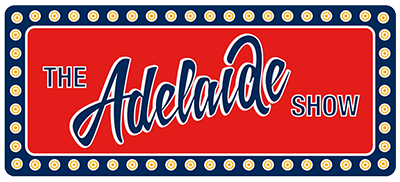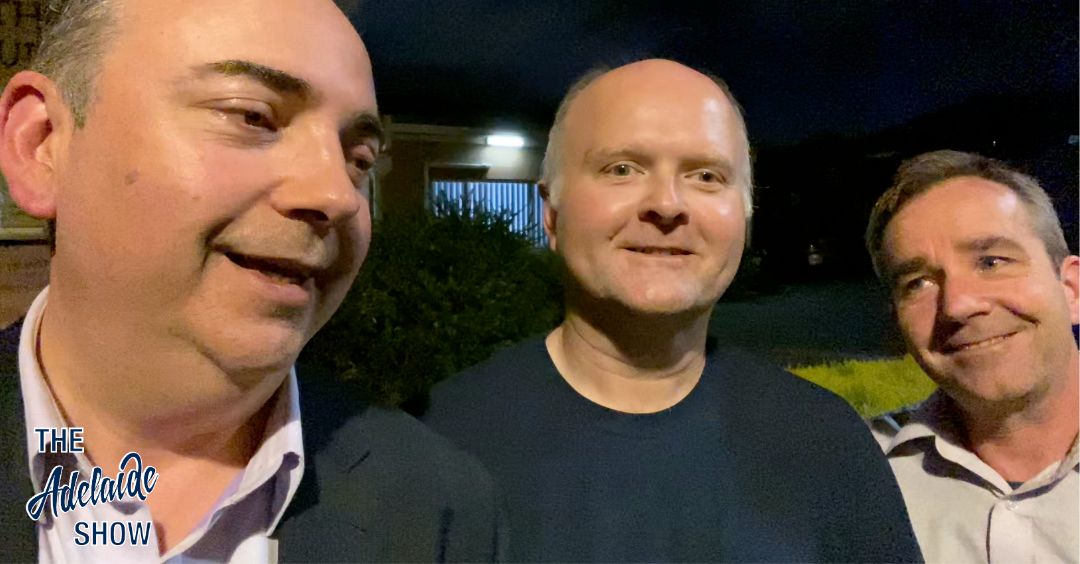In this week’s episode of The Adelaide Show, we talk to associate lecturer and fellow podcaster, David Olney, of Blind Insights with David Olney fame.
And joining me for this episode is former co-presenter, cognitive scientist, and student of geopolitics, Nigel Dobson.
This week, the SA Drink Of The Week is a Chardonnay from Hollick in Coonawarra.
And in the Musical Pilgrimage, we hear a song by local singer/songwriter, Alison Newman, to leave us with some optimism ahead of Christmas.
Adelaide Fringe: Steve is in two shows in the 2020 Fringe and would love to have you join him.
Innuendo Everywhere: Becky Blake and Steve Davis do it
2 Cats Drove Into The Cuckoos Nest
And please consider becoming part of our podcast by joining our Inner Circle. It’s an email list. Join it and you might get an email on a Sunday or Monday seeking question ideas, guest ideas and requests for other bits of feedback about YOUR podcast, The Adelaide Show. Email us directly and we’ll add you to the list: [email protected]
If you enjoy the show, please leave us a 5-star review in iTunes or other podcast sites, or buy some great merch from our Red Bubble store – The Adelaide Show Shop. We’d greatly appreciate it.
And please talk about us and share our episodes on social media, it really helps build our community. Oh, and here’s our index of all episode in one concise page
Running Sheet: Mr Dystopia David Oldney
| TIME | SEGMENT |
| 00:00:00 | Intro |
| 00:02:10 | SA Drink Of The Week |
| Bond Road Chardonnay by Hollick is the SA Drink Of The Week and we taste it with Hollick’s very own Meagan Downer |
|
| 00:08:10 | David Olney |
|
David Olney is one of those people with an enviable intellect whose life is also a sweet example of irony because although he is blind he sees the world more clearly than most. There’s something refreshing and sobering about listening to David lecture (as Steve did last month, as part of his course at the University of Adelaide entitled, Strategic Cultures and Unconventional Conflict) because he gives clear context to situations and practices the critical thinking discipline of charity to do his best to fairly represent the views of all parties to an argument. Apart from hosting Blind Insights (with Tim Whiffen) and Strategikon (which he does with Dr John Bruni for SAGE International Australia where he has his day job), David seems to be busy thinking a lot about the world and sharing his insights with all who listen.
David, do people in power listen to people like you? What came first: your interest in applied thinking and group psychology or your interest in the philosophies of vioelence and civil-military relations? Can we start with some thinking hacks. You train people to use and choose between various skills and heuristics (which we can call rules of thumb for thinking about things), so that they can ask deeper questions, see the assumptions and biases they are holding, and make better decisions. Why do humans need training in this? Are some cultures better than others? What are the most obvious symptoms of poor thinking we could look out for in ourselves and others? What are some baby steps we might take in getting sharper with our argument and critical thinking? And does this require amassing great knowledge or is it about techniques of thinking? Can we improve thinking systemically through the education system? I’ve been putting off the topic of war and conflict because after sitting in on your lecture entitled, Conventional Warfare and Adapting to the Unconventional, I felt quite spaced-out and depressed for the rest of the day and into the next day. So, I still believe I’d rather have eyes wide open than shut, so is there any advice on how to hold the upcoming discussion and maintain mental health? Was Edwin Starr right when he sang, war, what is it good for, absolutely nothing? Can war be good? Are there common forces that lead societies to war? What sort of cycles, if any, have we seen over the past 300 years with regards to Nationalism? I had a wake up call as a young man living in Budapest. For some reason, I’d pictured the world wars as taking places on battlefields, not right through cities and gardens and schools, etc. What does war look like now and what is it likely to look like? 9/11 was a major event for the world but not the biggest. Why was it so profound? How helpful is the label, terrorism? The London Bridge stabbing recently is very different to what we’ve imagined it to be. Why do we have trouble with this label? How much is the media’s hunger for titilation an enabling force for terrorism? Is it a better price than events happening without coverage? How predictable is the future, does anyone have a good track record of predicting bad events? What lessons about major collapses can we learn from history? What are the signs of the onset of dystopian futures. And, seriously, is it worth trying to prepare for loss of services? Is technology an enabling force for the development of dystopian futures? How can technology be used to reduce the chance of dystopian futures? We talk of 1984, Brave New World and Handmaids Tale how close are we or did we get to these futures? Is social media a weapon that is wreaking havoc? |
|
| 00:50:15 | Musical Pilgrimage |
|
In the musical pilgrimage, we have a track called It’s Not Christmas Without You by Alison Newman.
It’s a song about missing your loved ones at Christmas time, whether they be far away or they have passed on.
|
|
Here’s this week’s preview video.
SFX: Throughout the podcast we use free sfx from freesfx.co.uk for the harp, the visa stamp, the silent movie music, the stylus, the radio signal sfx, the wine pouring and cork pulling sfx, and the swooshes around Siri.

